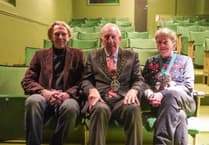The shocking findings of the Infected Blood Inquiry and the damning report released on Monday have brought relief and a sense of vindication to its many victims.
But the report and the forthcoming compensation won’t ease the “survivor’s guilt” felt by many past pupils of Lord Mayor Treloar College – nor will it bring back the late victims of one of the darkest episodes in British medical history.
A decades-long wait for justice ended early this week when an inquiry concluded that boys at the school were used as “objects for research” during the 1970s and 80s.
The report also states that NHS clinicians who treated pupils for blood disorders were complicit and “well aware” of the risk of infecting them with HIV.
The process included a week of special hearings about the school, with inquiry chairman Sir Brian Langstaff learning that its onsite NHS centre treated children using plasma blood products infected with HIV and hepatitis.
A commercial clotting agent called ‘factor concentrate’ was used “unnecessarily” on pupils routinely aged eight or nine.
The report adds that clinicians proceeded with higher-risk treatments despite knowing the dangers, and that “unparalleled” research was carried out at the college from 1977.
Sir Brian states in the report: “The pupils were often regarded as objects for research – this was unethical and wrong.
“Practice at Treloar’s shows that clinical staff were well aware their heavy use of commercial concentrate risked causing AIDS.”

Around £10billion in compensation could be awarded in a “meaningful redress” with campaigners also beginning a civil legal case against the college, which gave parents and children little information about their care and related risks at the time.
“We’ve been gaslit for generations and the report brings an end to that,” said Andy Evans, chairman of the Tainted Blood campaign group, while former pupil Richard Warwick called the period “horrific” with eight and nine-year-olds being routinely injected.
A statement released by the college said the report shows the “full extent of the “horrifying national scandal” and the “systemic failure” at its heart.
The statement continues: “We are devastated that some of our former pupils were so tragically affected and hope the findings provide some solace for them and their families.”
More reports will follow in the Herald and on this website.

-Cllr-Lulu-Bowerman-Tim-Lawton--Image-LDRs.jpeg?width=209&height=140&crop=209:145,smart&quality=75)



Comments
This article has no comments yet. Be the first to leave a comment.